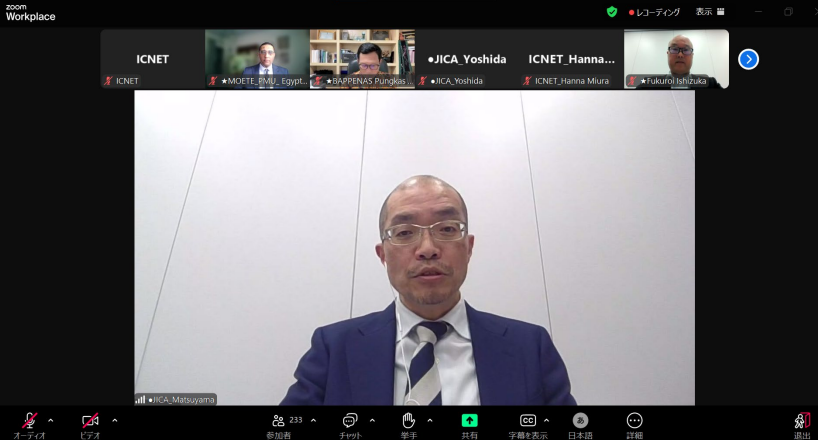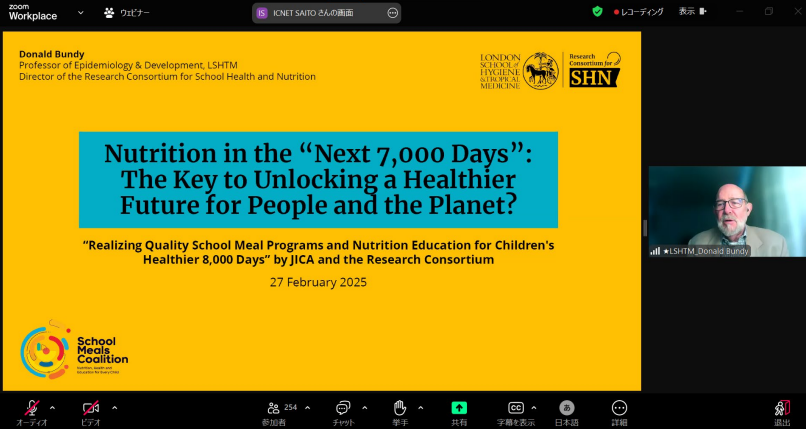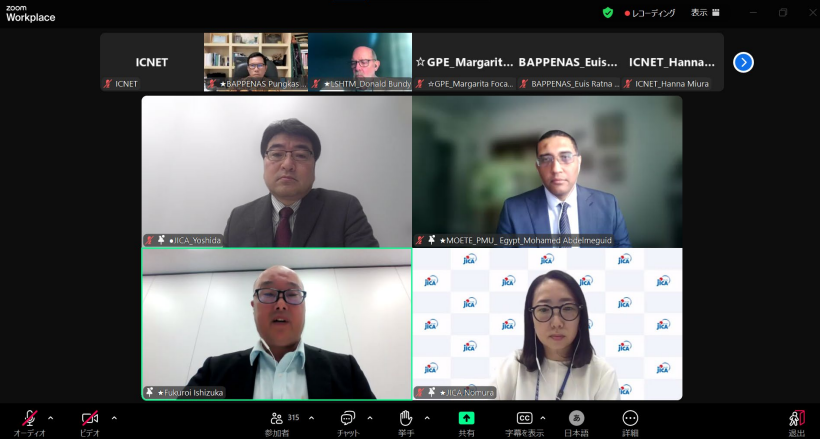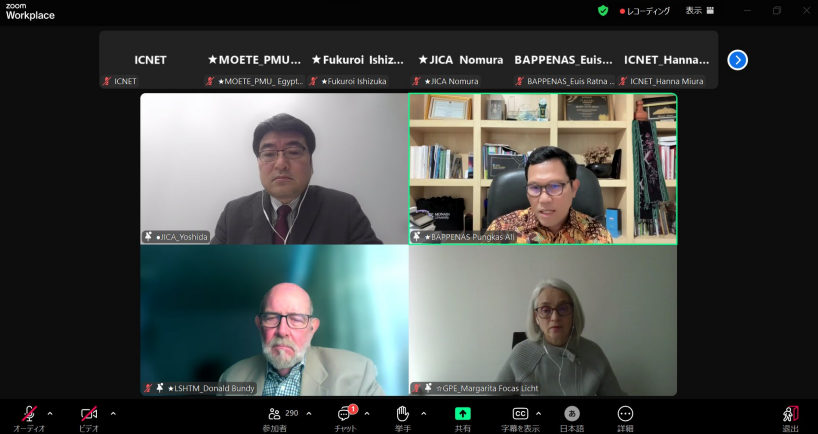Webinar related the Nutrition for Growth in Paris 2025: “Realization of quality school meal program and nutrition education for children's healthier 8000 days”
Day:2025.03.27
event |
Title: Realization of quality school meal program and nutrition education for children's healthier 8000 days
Date: Feb 25, 2025
Co-host: Japan International Cooperation Agency (JICA), Research Consortium for School Health and Nutrition, , London School of Hygiene & Tropical Medicine (LSHTM)
Place: Online
Webinar Link: Quality School Meal Program and Nutrition Education
Moderator: Mr. Tomoya Yoshida, Senior Deputy Director General and Group Director for Health 2, Human Development Department, JICA
Opening Remarks: Mr. Takeshi Matsuyama, Deputy Director General and Group Director for Basic Education, Human Development Department, JICA
Speaker 1: Prof. Donald Bundy, LSHTM
Speaker 2: Ms. Margarita Focas Licht, Partnerships Manager, Global Partnership for Education (GPE)
Speaker 3: Dr. Marika Nomura. Senior Advisor (Nutrition), JICA
Speaker 4: Dr. Pungkas Bahjuri Ali, Senior Advisor to the Minister for Social Welfare and Poverty Reduction, Ministry of National Development Planning, Indonesia (BAPPENAS)
Speaker 5: Dr. Mohamed Abdelmeguid Program Officer, JICA Project for Enhancement and Dissemination of Tokkatsu Models, Tokkatsu Department, Project Management Unit, Ministry of Education and Technical Education, Arab Republic of Egypt
Speaker 6: Mr. Koji Ishizuka, Delicious School Lunch Division Chief, Fukuroi Municipal Board of Education
Closing Remarks: Prof. Donald Bundy, LSHTM
Investing in nutrition, growth and wellbeing of school-aged children and adolescents during the “first 8,000 days of life” is critical to the economic and social future of all countries, in both high- and middle/low-income countries. Healthy and well-nourished children are more likely to achieve learning outcomes and have higher incomes in later life-course. In addition, establishing healthy eating habits during childhood can help prevent noncommunicable diseases (NCDs) in adulthood. To this end, it is necessary to maximize children's growth and human capital by utilizing school settings as platform during the “first 8,000 days of life”.
This webinar was held with the aim of exploring the potential of school meals to provide children with higher quality nutrition, and of nutrition education to promote the establishment of healthy eating habits, from the perspectives both from education and health sectors, and discuss measures to practice and promote them beyond the sectors. A total of 353 participants from 44 countries attended.
The speakers presented “Nutrition in the “Next 7,000 Days”: The Key to Unlocking a Healthier Future for People and the Planet?”, “School health and nutrition in support of education systems transformation”, “JICA's cooperation on school lunches and Shokuiku -Shokuiku: Nurturing sustainable and healthy choice-”, “Free Nutritious Meal Program for Indonesia Human Capital Development toward Golden Indonesia 2045”, “Promoting the establishment of healthy eating habits for Egyptian Students through Japanese Holistic model of Education” and “School Meals Leading to the Future of Japan -Supporting Japan's Healthiest Cultural City with the Best School Meals in Japan-”
In the subsequent panel discussion, we discussed the impact of efforts to improve nutrition in the education sector and how investments in school meals and food education can affect the 8,000-day period. The first discussion highlighted the impact of nutritional improvements on learning outcomes when the education and health sectors collaborate in addition to the potential ripple effects and possibilities of food and nutrition education for better health in their families and the communities. It was emphasized that, due to the differing objectives of the health and education sectors, it is important to share goals and adopt an integrated approach. Additionally, methods for monitoring and evaluation, as well as challenges in government funding across countries, were addressed. The second discussion compared successful cases and policy differences among countries, emphasizing the importance of building sustainable models and adopting flexible approaches that consider regional characteristics. The potential for international cooperation and the necessity of multisectoral collaboration for nutrition improvement were also discussed.
Prof. Bundy pointed out that the school meal program is a $48 billion industry affecting 420 million children worldwide. He also explained that 98% of the countries implementing school meals do so with their own national budgets, making it a national program rather than one reliant on the external support. He concluded by emphasizing that proper funding and multisectoral collaboration are essential for its success.
JICA continues to contribute to the achievement of SDG Target 2.2 (ending all forms of malnutrition by 2030) and other international nutrition goals by focusing on capacity building and ownership in developing countries, promoting a multisectoral approach, and strengthening collaboration with development partners to reduce the "double burden of malnutrition" (undernutrition and overnutrition) in developing countries.

Opening Remarks by Mr. Matsuyama, JICA

Presentation by Prof Donald Bundy, LSHTM

First Panel Discussion among Mr. Yoshida, JICA as moderator, Dr. Abdelmeguid, Mr. Ishizuka, and Dr. Nomura.

Second Panel Discussion among Mr. Yoshida, JICA as moderator, Dr. Ali, Prof. Bundy, Ms. Licht.
scroll